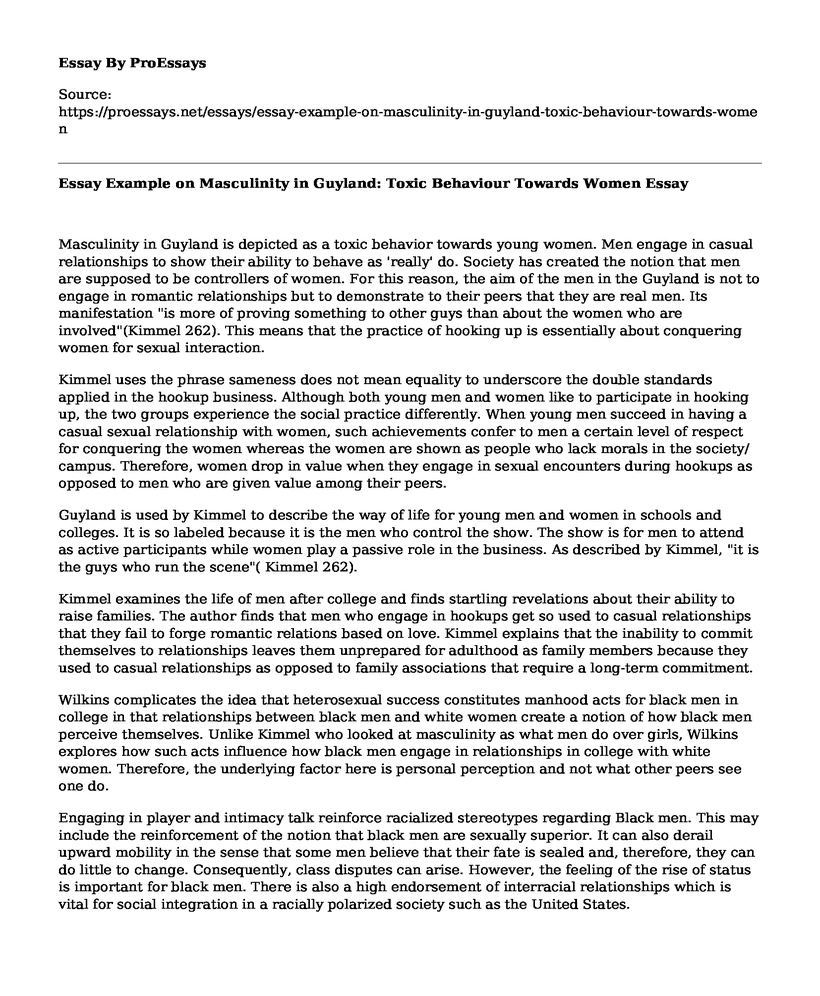Masculinity in Guyland is depicted as a toxic behavior towards young women. Men engage in casual relationships to show their ability to behave as 'really' do. Society has created the notion that men are supposed to be controllers of women. For this reason, the aim of the men in the Guyland is not to engage in romantic relationships but to demonstrate to their peers that they are real men. Its manifestation "is more of proving something to other guys than about the women who are involved"(Kimmel 262). This means that the practice of hooking up is essentially about conquering women for sexual interaction.
Kimmel uses the phrase sameness does not mean equality to underscore the double standards applied in the hookup business. Although both young men and women like to participate in hooking up, the two groups experience the social practice differently. When young men succeed in having a casual sexual relationship with women, such achievements confer to men a certain level of respect for conquering the women whereas the women are shown as people who lack morals in the society/ campus. Therefore, women drop in value when they engage in sexual encounters during hookups as opposed to men who are given value among their peers.
Guyland is used by Kimmel to describe the way of life for young men and women in schools and colleges. It is so labeled because it is the men who control the show. The show is for men to attend as active participants while women play a passive role in the business. As described by Kimmel, "it is the guys who run the scene"( Kimmel 262).
Kimmel examines the life of men after college and finds startling revelations about their ability to raise families. The author finds that men who engage in hookups get so used to casual relationships that they fail to forge romantic relations based on love. Kimmel explains that the inability to commit themselves to relationships leaves them unprepared for adulthood as family members because they used to casual relationships as opposed to family associations that require a long-term commitment.
Wilkins complicates the idea that heterosexual success constitutes manhood acts for black men in college in that relationships between black men and white women create a notion of how black men perceive themselves. Unlike Kimmel who looked at masculinity as what men do over girls, Wilkins explores how such acts influence how black men engage in relationships in college with white women. Therefore, the underlying factor here is personal perception and not what other peers see one do.
Engaging in player and intimacy talk reinforce racialized stereotypes regarding Black men. This may include the reinforcement of the notion that black men are sexually superior. It can also derail upward mobility in the sense that some men believe that their fate is sealed and, therefore, they can do little to change. Consequently, class disputes can arise. However, the feeling of the rise of status is important for black men. There is also a high endorsement of interracial relationships which is vital for social integration in a racially polarized society such as the United States.
Mora and Christian establish a relationship between college men's hypermasculinity and the hybrid masculinity. Hypermasculinity underscores use force to "engage in sexual acts with women as men report more willingness to use force to engage in sexual contact." This is hinged on the belief that power and control men have over women. When people feel that they a privilege over others, they are likely to develop demeaning behaviors towards the so-called inferior group. This is mainly linked to black college men who are depicted as useful in sexual acts which reinforces the narrative of violence against women.
Homosocial environments do not attach value to relationships. People operating in this environment see little in having a love relationship that would survive the test of time. The setting is riddled with violence people involve in sex are not motivated by love or romantic adventures. They are meant to satisfy the short-term goal of sexual encounters. Coupled the power to control, violence is often witnessed because the force is a common feature.
Conclusion
Teaching college men about the dangers of rape can be critical in addressing the rape crisis. Education should encourage men to participate in initiatives that target violence against women. Carrying out sensitization programs can evoke empathy to the victims thereby increasing their interest in the adverse effects of masculinity on women. Integration of the hypermasculinity in the curriculum can also go a long way in addressing the issue of men dominance in society. However, challenges such as stiff opposition from misogynists may curtail reasonable efforts such as those of Mora and Christian.
Cite this page
Essay Example on Masculinity in Guyland: Toxic Behaviour Towards Women. (2023, Jan 11). Retrieved from https://proessays.net/essays/essay-example-on-masculinity-in-guyland-toxic-behaviour-towards-women
If you are the original author of this essay and no longer wish to have it published on the ProEssays website, please click below to request its removal:
- The Role of Women in American Civil Wars Essay
- Essay Sample on Media Influence on Society
- Social Problems and Social Work Essay Example
- Emile Durkheim Theory Essay Example
- Essay Sample on Poverty Among African Americans
- Reid Lininger v St. Marys City School District: Gender Discrimination Case Analysis Essay
- Sentencing Guidelines, Mandatory Minimums & Fair Justice - Essay Example







